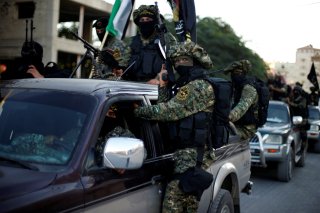Biden Must Give the Palestinian Authority a Wake-Up Call
Although the Biden administration is justifiably focused on Russia and Iran, it must also hold the Palestinians to account and declare that deepening alliances with America's enemies and breaching U.S. law will have consequences.
Over the past year, leading Palestinian factions have strengthened their relationships with some of the staunchest adversaries of the United States, including Russia, Iran, and even the Assad regime in Syria. At the same time, the Palestinian Authority—which receives hundreds of millions of dollars in U.S. aid annually—continues to violate American law by paying stipends to the families of terrorists who have engaged in attacks against Israeli citizens. Although the Biden administration is justifiably focused on Russia and Iran, it must also hold the Palestinians to account and declare that deepening alliances with America's enemies and breaching U.S. law will have consequences.
On October 13, Mahmoud Abbas, the president of the supposedly moderate Palestinian Authority (PA), met with Russian president Vladimir Putin. At the meeting, Abbas remarked that the PA does not trust the United States as a Middle East peace broker, adding that "Russia stands by justice and international law,” a laughable contention considering Russia’s ongoing illegal invasion of Ukraine.
The meeting occurred a mere week after the PA’s second-in-command, Hussein al-Sheikh—the likely candidate to replace the eighty-seven-year-old Abbas when his long-overdue tenure ends—met with National Security Adviser Jake Sullivan and Deputy Secretary of State Wendy Sherman in Washington. It’s unclear what the parties discussed, but it likely revolved around the PA’s looming succession crisis and the nature of the U.S.-Palestinian relationship moving forward.
Adding insult to injury, although the Biden administration has given over $500 million in assistance to the Palestinians since April 2021, with an additional $316 million recently announced for general support and $201 million for the UN Relief and Works Agency for Palestine Refugees, the PA continues to implement its notorious “pay for slay” policy, through which it pays stipends to terrorists and their families, according to a non-public State Department report obtained by the Washington Free Beacon.
Additionally, other Palestinian factions (designated as terror groups by the United States) have met with key Russian allies like Syria and Iran, the latter of which has reportedly been dispatching drones and members of the Islamic Revolutionary Guards Corps (IRGC) to aid Russia in its war against Ukraine.
For example, on October 19, a Palestinian delegation that included Hamas arrived in Syria to meet with President Bashar al-Assad. The move signaled the completion of a gradual rapprochement between the two sides, which first broke apart in 2012 after Hamas expressed support for the rebels in the Syrian Civil War. Hamas hailed the meeting as a “glorious day,” stating that it will resume its “presence in Syria and work with Damascus in support of our people and Syria’s stability.”
The newly strengthened ties are reportedly a product of talks facilitated by Iran, which has a vested interest in coalescing an anti-American, anti-Israel coalition in the wake of the U.S.-brokered Abraham Accords peace agreements.
Relatedly, Hamas’ political bureau chief, Ismail Haniyeh, met with Iran’s ambassador to Russia in September, where the two reiterated their joint interests. Iran reportedly provides $100 million annually to Hamas to help it develop missiles and defense systems.
The Islamic Jihad Movement in Palestine (PIJ), which had a brief confrontation with Israel over the summer, is a proxy of Iran in the truest sense of the word. PIJ has been armed by Tehran for years and, according to Israeli sources, “has an annual budget of $100 million, most of which is provided by Iran in payments made via money changers and supposed welfare organizations.”
Likewise, the Popular Front for the Liberation of Palestine has boasted about its ties to the Islamic Revolutionary Guard Corps and has reportedly been receiving military and financial aid from Tehran since 2013.
The growing ties between Iran and the various Palestinian factions are part of the Iranian regime’s strategy to have its proxies slowly overtake the PA and dominate the Palestinian-controlled territories, a reality that seems increasingly likely considering the PA’s waning popularity.
The Biden administration should not ignore the Palestinians' decision to double down on ties with Russia, Iran, and Syria. Although its options regarding the terror groups are limited, the United States should reiterate to the PA that it cannot allow Iranian influence to continue penetrating its territory, nor can it plead for aid and overtures on the one hand, then violate U.S. law and embrace America's enemies on the other. With President Abbas’ tenure nearing its inevitable conclusion and new leadership preparing to take the reins, this may be the Biden administration’s best shot at resetting its dynamic with the PA.
Eitan Fischberger is an international relations and Middle East analyst based in Israel. His work has been published in NBC News Think, National Review, and more. Tweet him @EFischberger.
Image: Reuters

